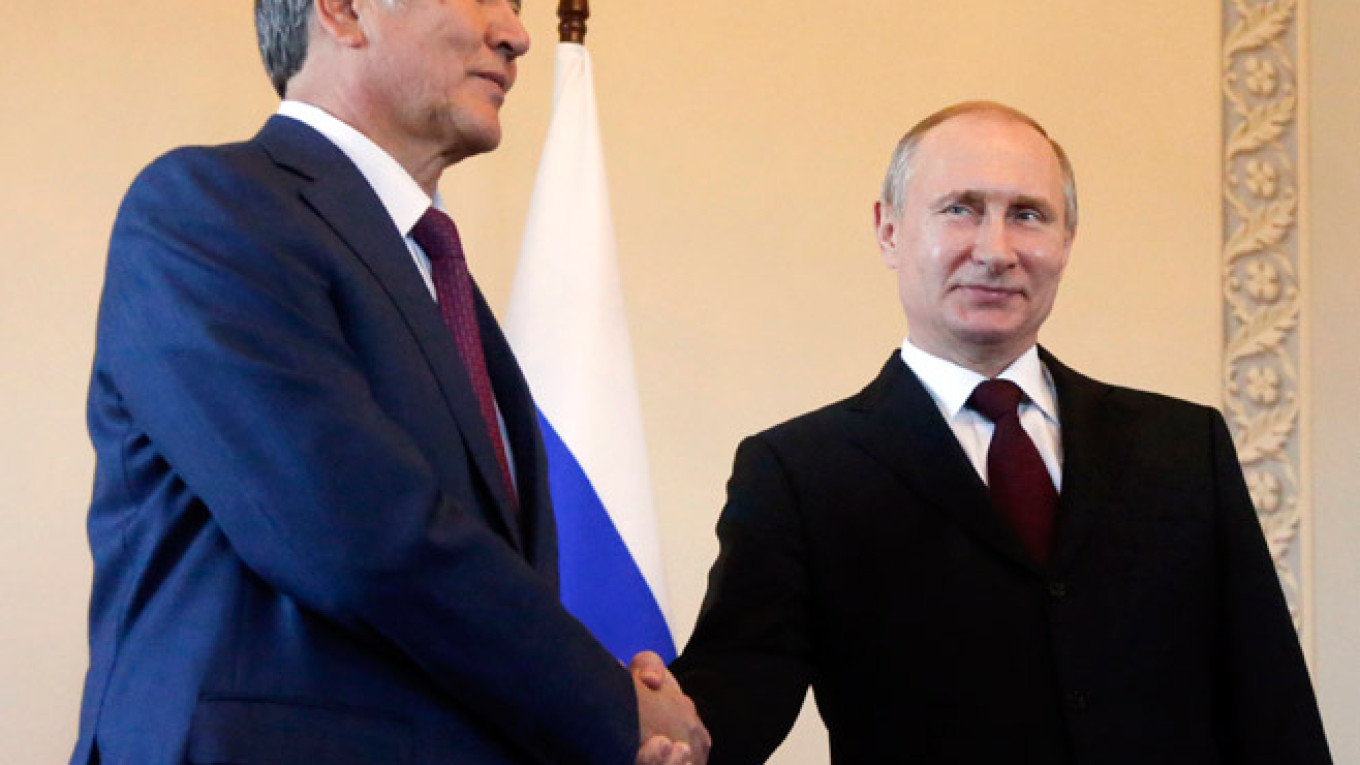Russian President Vladimir Putin resurfaced Monday, smiling and looking his normal self after a 10-day absence from public view that fueled a wave of rumors about his health.
Kyrgyz President Almazbek Atambayev, who met with Putin in St. Petersburg's ornate Konstantin Palace on Monday, referred to the swirling speculation about Putin by noting that the Russian leader was in good shape. He said Putin drove him around the palace's park before the talks, adding that "the president of Russia not only walks, but speeds around."
"It would be dull without gossip," Putin retorted with a smile.
The 62-year-old Russian leader was last seen in public on March 5, when he hosted Italian Prime Minister Matteo Renzi. The Kremlin insisted that he continued holding official meetings after that, and released photos and video of Putin at meetings on national television, but Russian media suggested the images had actually been shot much earlier.
Putin's decision to abruptly postpone a trip to Kazakhstan planned for last week fueled speculation that he was unwell or isolated by a palace coup. A Swiss newspaper claimed that Putin had traveled to Switzerland, where it said his reported girlfriend — former Olympic gold-winning gymnast Alina Kabayeva — had given birth to their baby. The Kremlin has denied all those allegations.
Putin's spokesman Dmitry Peskov greeted reporters Monday with sarcastic remarks: "So, have you seen the president paralyzed and seized by the generals? He has just come back from Switzerland, where he attended the delivery."
Asked if Putin's condition required treatment by an osteopath, the spokesman retorted: "Yes, the osteopath was with the generals."
The sarcastic comments appeared to reflect the Kremlin's dismay with the rumors and its inability to stop them. On a more serious note, Peskov added that the Kremlin has grown tired of refuting speculation about Putin's condition.
"The more we talk about it, the more intense [the speculation] becomes," he said.
Putin's sudden disappearance from the public eye coincided with a moment of high tension in Russia's domestic politics. Many Putin foes held him responsible for the Feb. 27 killing of top opposition figure Boris Nemtsov, even as the Russian leader described Nemtsov's slaying on a bridge in Moscow as a "disgrace" and a "provocation."
Some observers speculated the arrest of five ethnic Chechens, including a senior police officer, suspected of involvement in Nemtsov's killing signaled a fierce turf battle between Chechnya's Moscow-backed leader, Ramzan Kadyrov, and top Russian officials from federal law-enforcement agencies who resent the feisty strongman.
A Message from The Moscow Times:
Dear readers,
We are facing unprecedented challenges. Russia's Prosecutor General's Office has designated The Moscow Times as an "undesirable" organization, criminalizing our work and putting our staff at risk of prosecution. This follows our earlier unjust labeling as a "foreign agent."
These actions are direct attempts to silence independent journalism in Russia. The authorities claim our work "discredits the decisions of the Russian leadership." We see things differently: we strive to provide accurate, unbiased reporting on Russia.
We, the journalists of The Moscow Times, refuse to be silenced. But to continue our work, we need your help.
Your support, no matter how small, makes a world of difference. If you can, please support us monthly starting from just $2. It's quick to set up, and every contribution makes a significant impact.
By supporting The Moscow Times, you're defending open, independent journalism in the face of repression. Thank you for standing with us.
Remind me later.


